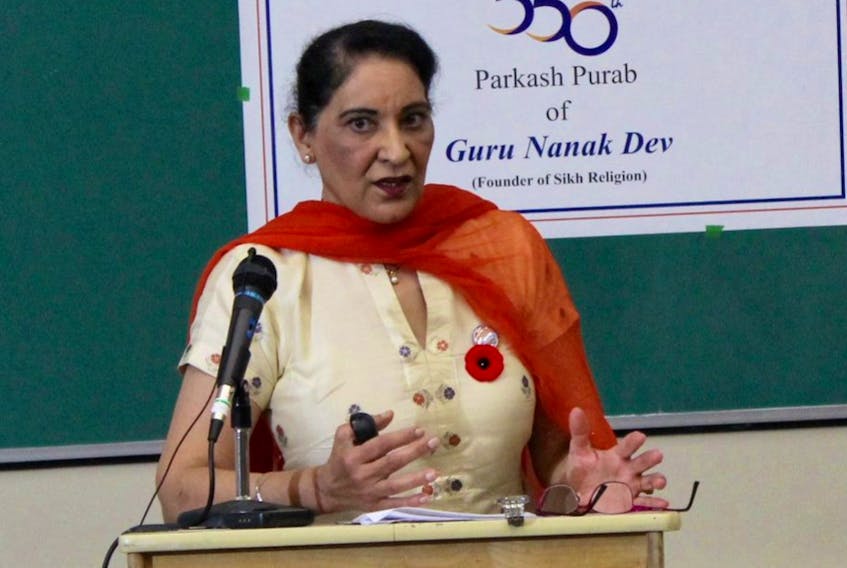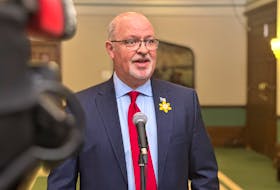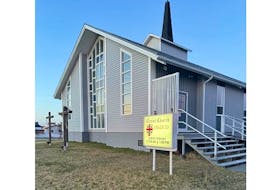ST. JOHN'S, N.L. — About 70 people gathered at a lecture hall in Memorial University’s Science Building on Saturday for a Symposium on Sikh Religion in celebration of the 550th birth anniversary of Guru Nanak Dev, the founder of Sikhism.
It marked the beginning of the celebrations. On Monday, a religious ceremony will be held at the Easter Seals building on Mount Scio Road with scripture readings and the sharing of langar — a free meal, which is a tradition of Sikhism.
The symposium was organized by the Newfoundland Sikh Society (NSS), a non-profit organization of the Sikh community which supports various initiatives such as the Single Parents Association, school lunch programs and natural disaster aid.
A member of the NSS, St. John’s resident Rubin Deol, said they decided to start the celebrations of Guru Nanak’s birth with the symposium to clear the air about Sikhism.
“People have questions. We are a very small community in Newfoundland, and mostly we are in St. John’s. We have a small temple on Logy Bay Road. So, people ask, who are they?”
There are about 50 to 60 Sikh families in the province.
“This is an occasion that we can reach out to people and say, ‘This is who we are, this is what our religion speaks of,'” he said.
Mohinder Singh Grewal said everyone in the Sikh community was looking forward to the celebrations.
“This day is celebrated all over the world, so it’s very important. But being a very small community here, it’s not with great pomp and show.”
Facts about Sikhism
Pamphlets handed out at the symposium highlighted some basic facts about the religion.
“Sikhism remains one of the most unknown traditions in western society, especially in North America,” reads the pamphlet.
“The lack of understanding has led to serious consequences, including discriminatory policies, traumatic school bullying and violent hate crimes.”
Some facts highlighted in the brochure include:
• Oneness and love serve as the foundations of Sikh theology.
• Sikhism challenges all social inequalities, including those based on class, caste, gender and profession.
• Guru Nanak modelled social engagement by critiquing social inequalities, building institutions that serve and empower the disenfranchised, and publicly critiquing political oppression.
• Two Sikh gurus were executed because they stood up against tyranny, and stood for the rights of people to practice different religions.
Historic moment
On everyone’s lips at the symposium was news that after more than 70 years, Indian Sikhs will now be able to visit one of the religion's holiest sites — Kartarpur Sahib, where Guru Nanak spent the last 18 years of his life — by crossing the border with Pakistan without a visa.
It’s the result of a historic, unprecedented agreement between India and Pakistan that was made official on Saturday.
The Kartarpur Corridor is a mere 4.1 kilometres, but when British India was divided into the two states of India and Pakistan 72 years ago, those few kilometres may as well have been thousands.
“It’s giving me goosebumps,” Sukhinder Kaur Cheema, a Memorial University biochemistry professor, said during her talk at the symposium.
“I believe it is the message of brotherhood that Guru Nanak gave that has made it possible.”
Inter-faith dialogue
One of the four speakers at the symposium was an Anglican priest, Rev. David Burrows, who gave a talk titled, "Being with the Sikh community in Newfoundland and Labrador — Inter-Faith Dialogue, Presence, Partnership — One Christian Perspective."
“Your truth is different from mine,” he said.
“It is rooted in a different story and a different history, but it is just as valid, just as complex and just as mysterious for the disciple and the newcomer.”
Burrows said the core of inter-faith dialogue is not about a view that all faiths can somehow be melded together.
“Instead, the core is that we are called to be with each other. To be present, and honour the reality of our different expressions and beliefs, and find ways to live in partnership with each other.”









